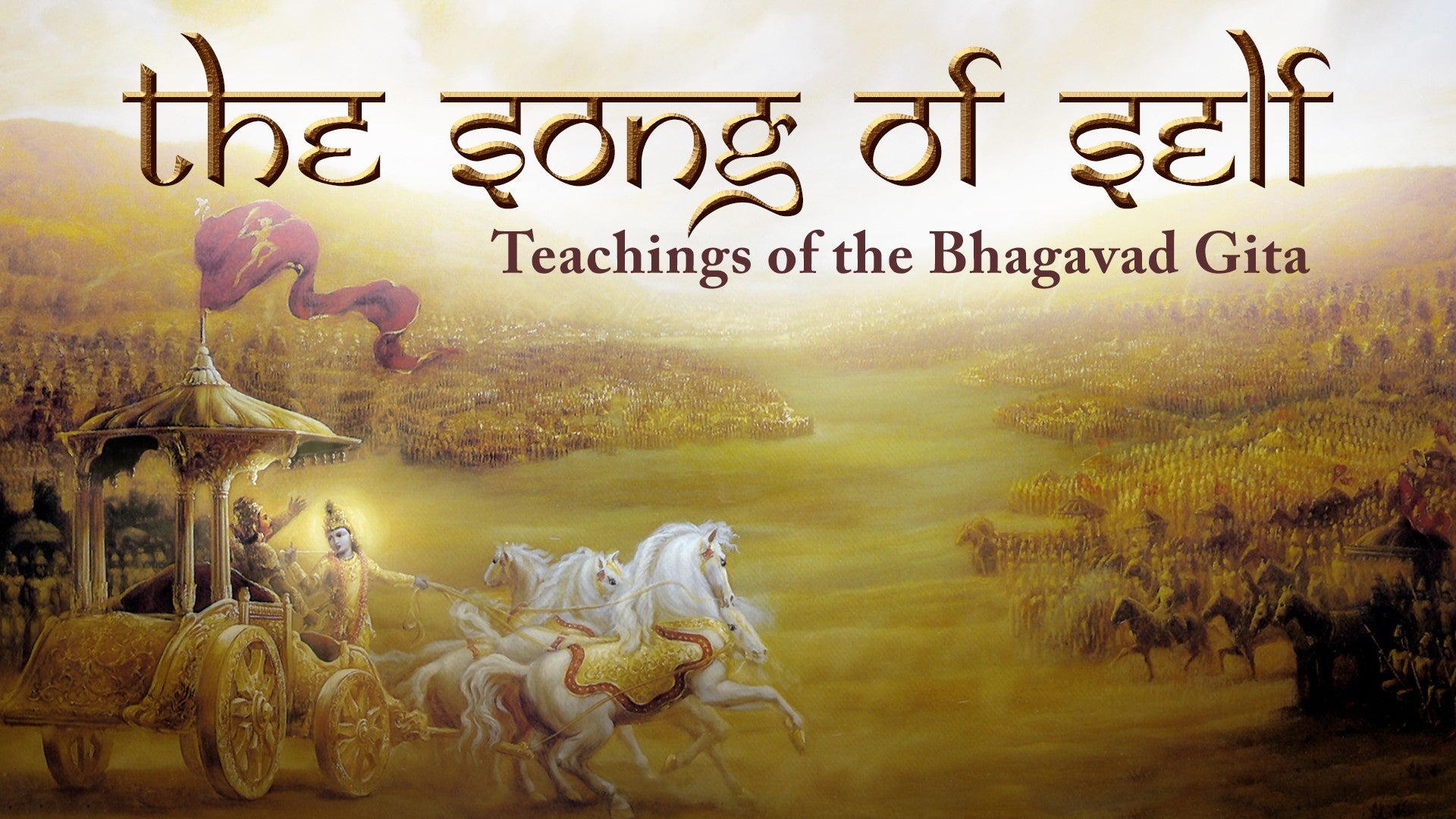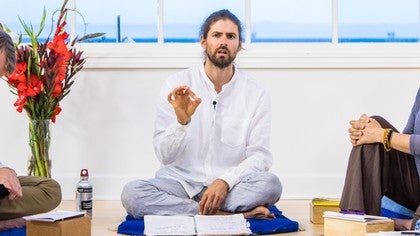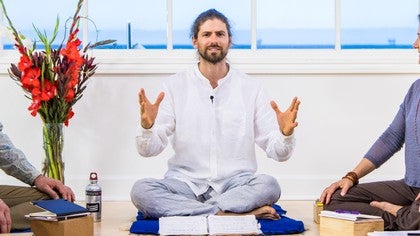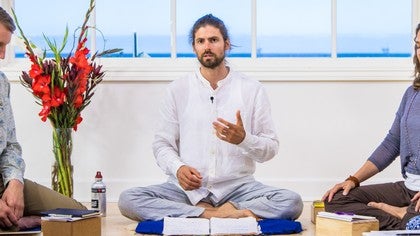Description
About This Video
Transcript
Read Full Transcript
So now the 66th verse. Here, there's a word that appears, which is quite a significant word in the Gita. Krishna uses the word ayuktasya, and yukta is this idea of being connected. It's from the same verbal root that gives us yoga. So if you're yukta, it basically means you are connected, you are integrated. And Krishna, in subsequent chapters, he will talk about the yogin or the steady one as being yukta. In other words, that person is yukta connected to their pragya, to their innate deep wisdom. They're connected in the sense that all the different powers which constitute their being are all integrated. They're all connected to the center of the animating essence. And so all the various instruments can work together efficiently and powerfully without loss of energy. And so such a person who is yukta really embodies those definitions of yoga that Krishna mentioned earlier in the 48th and 50th verses, samatva and karmasakoshalam. When we are yukta, we are connected, we are integrated in such a way that we're balanced. And so we can actually act, engage with efficiency and with skillfulness. So in this verse in the 66th, Krishna emphasizes kind of the primacy of being integrated, of being in balance as we cultivate that steady wisdom, as we cultivate yoga. And he says, nasti buddhi ra yuktasya naccha yuktasya bhavana naccha bhavaya tashanti irashantasya kutasukam. So basically four sentences here. And the first is that ayuktasya buddhi nasti. Ayuktasya means of a person who does not have yukta. So one is not connected, one is not integrated, buddhi nasti. When you're not in an integrated, balanced, connected state, it's like there is no clarity of vision. Buddhi, discernment, discrimination, the capacity to really draw on our deeper wisdom, it's not there. And second sentence, ayuktasya nabhavana naccha. And when you're not connected, it's like you have no foundation. You have no steady base. And when you have no foundation, abhavayata shanti hi nasti, you have no peacefulness. Ashantasya kutasukam. And when you have no peace, how can you be happy? It's the basic idea. If you're not really integrated, if you're not being courageous enough to allow all the parts of yourself to come together as one, how will you actually see clearly? Because you'd be denying part of yourself. How will you actually make the true wise decision? Because you're a kind of neglecting part of yourself. And if you're not connected, if you're not integrated, how do you have a stable platform?
How can you be rooted if part of you is not invited into the foundation? And if you don't have that integration, you don't have that stable foundation. Without a stable foundation, how can you know peace? And without peace, how can you be happy? So Krishna is kind of describing, again, a state that's perhaps not what we'd like to experience. But again, we can see that inherent within this first, there is a prescription. But it's not, well, that's not really the right word, is it? Because prescriptions, you've got to do this. It's really an invitation. He's suggesting, what is yoga practice? Cultivate integration, cultivate steadiness. Now, when we talk about yoga practice, here Krishna is saying, if you don't have kind of a firm foundation, you won't have peacefulness. So if you want to have a firm foundation, really, you've got to develop confidence in yourself. So it's interesting, in the yoga sutra, when Patanjali starts to describe the yoga practitioner. Once he's described what yoga practice is, only a few sutras later, in the 20th sutra of the first chapter, he mentions a few qualities that are important for a yoga practitioner. In the 20th sutra, Patanjali says, shraddha viriya smithya samadhi pragnyapurvaka itariya shaam. In the previous 19th sutra, Patanjali says, some people are basically just born into the state of yoga, well and good, but itariya shaam, but for others, pragnya, that state of clarity, of deep connection to their intuitive knowledge, knowing and wisdom, purvakam, is preceded by these four qualities, shraddha viriya smithya samadhi. For samadhi, integration, connectivity. When we experience integration and connectivity, as we already mentioned in the last couple of verses, prasada, integration, leaves a deep impression. It becomes part of our smithya, part of our memory. So once we cultivate samadhi, cultivate integration, it becomes part of our known experience. And so it can bolster and encourage our shaddha and our viriya. Now these words, shaddha and viriya, they're a beautiful reach in the Sanskrit. Now shaddha, often if you go to a translation of Patanjali's Yoga Sutra, the first word that may be featuring in the translation is faith, F-A-I-T-H. But I'm fairly confident, when I say faith, it will mean something different to all of us. And it's also possible that some people when they hear the word faith, they might recoil, they might feel a certain revulsion. Because some people have the ayu that faith means believing in something you know isn't true. And that is very, very far from what shaddha means, because shaddha means a different type of faith. The type of faith that grows from putting something to the test in the arena of your own experience. And this is shaddha. So it could just as readily be translated as conviction or confidence. And viriya, vira is a hero. Viriya is the quality of a hero, heroic valor. In other words, courage, steadfastness. The courage to stand true to what you believe is right, what you believe in it, even if the rest of the society is flooding in the opposite direction. And so the idea, if you want to practice yoga, you have to cultivate these qualities. You have to cultivate your confidence. You have to cultivate your conviction. You have to cultivate your courage. Because sometimes it will require heroic valor to continue to practice when the world and people around you offer you countless diversionary alternatives to pursuing the path of self-realization. So here in the 66th verse, Krishna is making it clear, if you don't know peace, how can you be happy? And we want to be happy. This is the supposition that generally we would like to be happy. And for happiness, peace is a great foundation. But if you want to have peace, you need to have some kind of steadiness. And if you want to be steady, the best recipe, invite all parts of yourselves into steadiness. At first, it might be very unsettling to invite certain parts of yourself into your conscious awareness. Often as human beings, there are parts of ourselves we prefer to kind of just keep back there in our back pocket or in our backpack and not really show it to the world. But when the backpack has got lots of things we're not going to share in it, what does it become? It kind of weighs us down and stops us actually showing ourselves and sharing more fully. And so the idea here is the connectivity, the integration is kind of the point of departure from that connectivity, from that wholehearted sincere effort to invite every part of you into the here and now. Then you'll get more and more of a solid foundation.
And then you can expand your understanding of what true peacefulness is. And from that foundation, that can help you access true deep happiness.
The Song of Self: Bhagavad Gita: Chapter 2
Comments

You need to be a subscriber to post a comment.
Please Log In or Create an Account to start your free trial.








